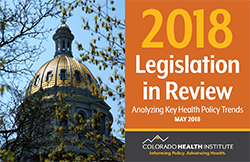Waiting for 2019
The state Capitol’s three main power centers have existed in an uneasy balance over the past four years. Republicans hold a one-seat majority in the Senate, Democrats run the House, and Hickenlooper, a business-friendly Democrat, occupies the state’s top office.
At least one of those power centers will change after the November election.
Hickenlooper is term-limited and will leave after eight years. Democrats and Republicans will choose their candidates to replace him in the June 26 primary election. The race has drawn more credible challengers than Colorado has seen in a long time.
The Democratic primary ballot has four names: former state Sen. Mike Johnston, former state Treasurer Cary Kennedy, Lt. Gov. Donna Lynne and U.S. Rep. Jared Polis. Republicans also have four candidates: former Parker Mayor Greg Lopez, former state Rep. Victor Mitchell, businessman Doug Robinson and state Treasurer Walker Stapleton.
A November victory by any of the Democrats would shift the state’s health policy to the left. All four have called for a public insurance option or other government-sponsored insurance. Republican candidates have been less vocal about health issues, although Stapleton has called for dismantling Connect for Health Colorado, the online insurance marketplace.
If Democrats can pull off a sweep — winning back the Senate while holding on to the House and governor’s office — then look for a lot of bills that failed the past four years to be resurrected in 2019.
Health legislation, in particular, often passed the House and died in Senate committees. For example, a Democratic Senate majority likely would have passed a reinsurance program and a study of a Medicaid public option.
Theme 1: Opioid Bills Steal a Win
Following the work of the 2017 Interim Committee on Opioid and Other Substance Use Disorders, which voted to introduce six bills (described below), it was clear that efforts to address the opioid epidemic would be top-of-mind for lawmakers this session. Senate Bill (SB) 40, to allow a supervised injection site, was disposed of in mid-February — but the rest were not decided until the final few days of the session. At various points, progress stalled, and other budget priorities seemed to elbow ahead. But five bills passed, and the package’s 83 percent success rate is one of health policy’s biggest wins in such a partisan year.
SPOTLIGHT: HB 1136: Substance Use Disorder Treatment
The most surprising success of the opioid bills, HB 1136 directs the state to pursue a federal waiver to add residential and inpatient SUD treatment and medical detoxification services to the list of Medicaid benefits. The bill’s champion, Rep. Brittany Pettersen (D-Lakewood), convinced her colleagues to focus on the manageable costs to develop the program next year, rather than on the predicted $34 million net budget impact in fiscal year 2020-21. Hickenlooper signed the bill into law but included a letter that noted the large proposed costs and lack of treatment facilities. The letter asked hospitals to expand their services to meet the need.
Theme 2: Transparency Push Trips Up
For several years, legislators have made health care transparency a major topic of discussion. We saw new versions of previously failed bills to address hospital costs, pharmaceutical pricing and freestanding emergency departments (EDs). Legislators managed to find consensus on old ideas about freestanding EDs, showing that persistence can pay off, but they didn’t agree on much else. Hospitals were on the hot seat, but largely defended themselves from attempts to open their books and publish an exhaustive list of their services and prices. The lesson? Lauding the value of transparency is easy, but agreeing on actual policy change is hard.
SPOTLIGHT: HB 1358: Health Care Billing Disclosures
The bill would have required almost all health care providers, including hospitals, surgical centers, community clinics and physician groups, to publish their charges for health care services and include detailed price breakdowns on patients’ bills beginning in 2019. It also would have required pharmacies to publish a list of retail drug prices and insurance carriers to share additional information about contracts and pricing. The far-reaching bill failed overwhelmingly in committee (12-1), but backers are working to get it on the statewide ballot so voters can have the final say.
Theme 3: Still Struggling with Cost Control
If transparency stumbled this session, cost control fell completely flat. Despite the lack of progress on bills, however, legislators seem to be inching forward on reining in high and rising insurance prices. Some ideas were recycled from previous legislative sessions, while newer concepts, such as creating a reinsurance program or instituting Medicaid work requirements, emerged. Various pieces are now on the board — and the next moves will depend heavily on the outcomes of the election in November.
SPOTLIGHT: HB 1392: State Innovation Waiver Reinsurance Program
HB 1392 would have directed the state to apply for an Affordable Care Act (ACA) waiver to establish a reinsurance fund. The fund would have helped insurance carriers pay for high-cost customers, with the idea that insurers could in turn reduce premiums for the rest of their customers who purchase insurance on the individual market. Alaska has been operating a similar model with well-documented success.
SPOTLIGHT: SB 214: Request Self-Sufficiency Medicaid Waiver Program
Would have directed HCPF to submit a waiver to the federal Centers for Medicare & Medicaid Services (CMS), which would require able-bodied Medicaid enrollees to be working, seeking work, or enrolled in school or a job-training program. Such requirements have been pursued recently in other states and caught the eye of two Colorado Republicans as a means to reduce costs and encourage personal responsibility. In addition, the bill would have required able-bodied adults to verify their income eligibility each month and established a five-year lifetime limit on Medicaid benefits for nonexempt enrollees.
Theme 4: Modest Progress on Mental Health
Colorado legislators struggled to decide how — and if — to fund suicide prevention efforts. Three bills supporting suicide determent for youth failed in the Senate, largely due to philosophical disagreements over the appropriate role of government in addressing social problems. There was some progress, however. A bill provided funding for a new school-based suicide prevention program, and legislators agreed to create a behavioral health ombudsman position and support efforts to better link people in the criminal justice system with behavioral health care.
SPOTLIGHT: Behavioral Health and the Criminal Justice System
In the final weeks of the session, a group of Senate bills addressed the connection between behavioral health and the criminal justice system, including jails and courts. The issue received funding commitments during the state budget debate. One measure addressing competency evaluations, SB 252, failed when Sen. Irene Aguilar (D-Denver) blocked a vote on the final evening, while several others passed.
Theme 5: Heated Battles Over Environmental Health
In Colorado and beyond, conversations are building about the intersection of climate change, energy and health. Health policy researchers are increasingly studying these linkages, following the American Public Health Association’s declaration of 2017 as the Year of Climate Change and Health. But for all the hours of debate in committee and on the House and Senate floors, only a couple of energy-focused bills passed. The rest were mired in partisan disagreement.
SPOTLIGHT: SB 3: Colorado Energy Office
Makes changes to the Colorado Energy Office and its responsibilities through repealing several mostly inactive programs and creating new requirements, such as adding nuclear and hydroelectric power to the list of energy sources the office must promote.
Grab Bag: Other Notable Health Bills
Not all health policy legislation fit neatly into one of our five categories. Notable bills tackled subjects from rural broadband and public health to interstate licensure and pharmacy choice. Here’s a sampling of what we watched during the session.
SPOTLIGHT: SB 237: Out-of-Network Providers Required Notices by Carriers
Would have required health insurance carriers to cover emergency services that are provided out-of-network at in-network benefit levels. For nonemergency services, SB 237 would have strengthened existing requirements for notifying patients.
Not all health policy legislation fit neatly into one of our five categories. Notable bills tackled subjects from rural broadband and public health to interstate licensure and pharmacy choice. Here’s a sampling of what we watched during the session.
SPOTLIGHT: SB 27: Enhanced Nurse Licensure Compact
The first bill signed into law this session, SB 27, was rushed through to meet a January 19 deadline. It allows new nurses to practice in any of 27 licensure compact states without needing a state-specific license and maintains licenses for 86,000 nurses who would have otherwise had to reapply and undergo another background check. By enabling nurses from any participating state to practice in-person or via conference call or computer link, Colorado hopes to reduce its nursing shortage.
Not all health policy legislation fit neatly into one of our five categories. Notable bills tackled subjects from rural broadband and public health to interstate licensure and pharmacy choice. Here’s a sampling of what we watched during the session.




